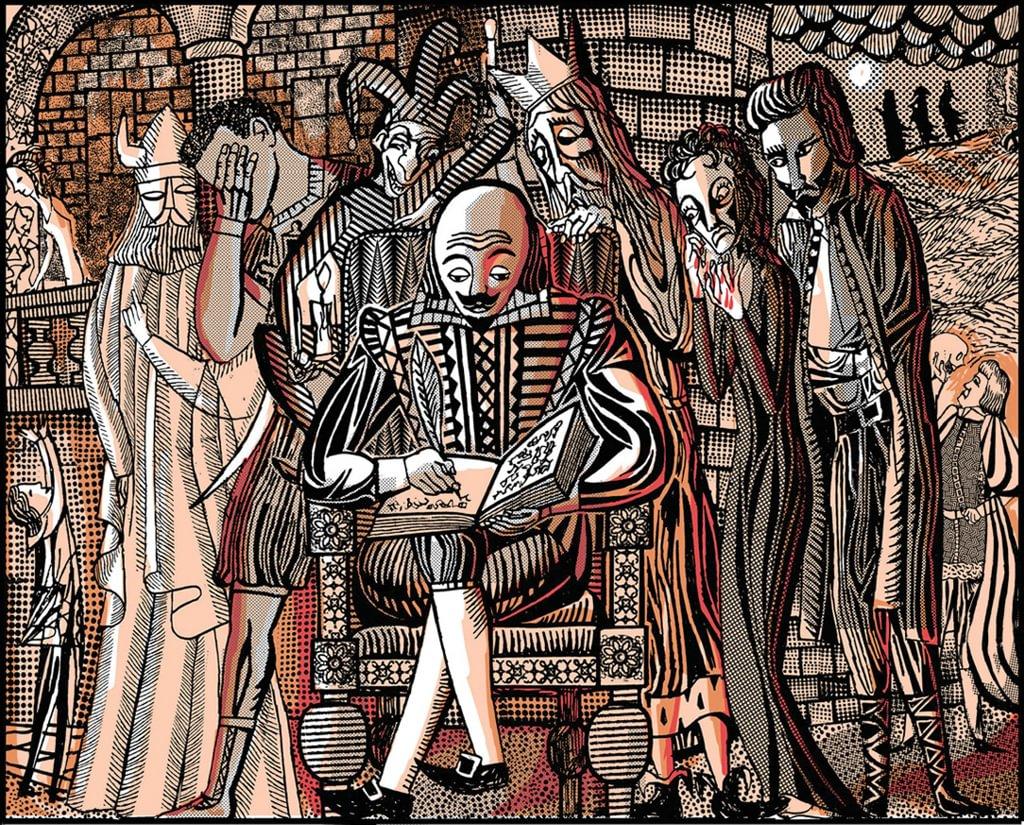
William Shakespeare with characters from his tragedies
illustration by John BroadleyIn his best-selling biography of Elon Musk, Walter Isaacson tries to explain how a man who attempts such “epic feats” can also be “an asshole.” He finds himself seeking help from William Shakespeare: “As Shakespeare teaches us, all heroes have flaws, some tragic, some conquered, and those we cast as villains can be complex.” How better to fill the gap between epic and asshole than with the lesson Shakespeare was apparently trying to teach us when he wrote Hamlet and King Lear? The only other time the word “tragic” appears in Isaacson’s book is when Musk is regretting his choice of outfit for an audience with the pope: “My suit is tragic.” When tragedy encompasses such trivialities, it’s not so hard to believe that those great plays really are trying to teach us something as trite as the possibility that humans are complex or that powerful people may have some serious defects. Who knew?
Isaacson is not unusual in making such statements about what Shakespeare’s tragedies mean: they exist to instruct us, and their main lesson is that everything would be OK if only we could “conquer” our shortcomings. We can read in The Guardian, of the Harry Potter novels, that “some of the most admirable adult characters, as in Shakespeare, are also revealed to have a tragic flaw that causes them to hesitate to act, to make foolish errors of judgment, to lie, or even to commit murder.” The New York Times informs us that
with Marlowe’s Doctor Faustus or Shakespeare’s Hamlet, their tragic flaws, enacted, became the definition of tragedy. It may be angst (Hamlet), or hubris (Faustus), but it’s there and we know, watching, that the ruinous end will be of their own making.
The former British prime minister Boris Johnson, who has supposedly been writing a book about Shakespeare, and who compared himself in the dying days of his benighted regime to Othello beset by malign Iago, claims that “it is the essence of all tragic literature that the hero should be conspicuous, that he should swagger around and that some flaw should lead to a catastrophic reversal and collapse.”
Also in The New York Times Stephen Marche tells us that
we go to tragedy to watch a man be destroyed. Macbeth must be destroyed for his lust for power, Othello for his jealousy, Antony for his passion, Lear for the incompleteness of his renunciation. They are tragic precisely because their flaws are all too human.
In a review of a biography of Andrew Jackson, the president is called a “‘Shakespearean tragic hero,’ inflexible as Coriolanus, whose tragic flaw was ‘his incessant pursuit of virtue in the political realm.’” Maureen Dowd notes that Barack Obama “has read and reread Shakespeare’s tragedies” and “does not want his fatal